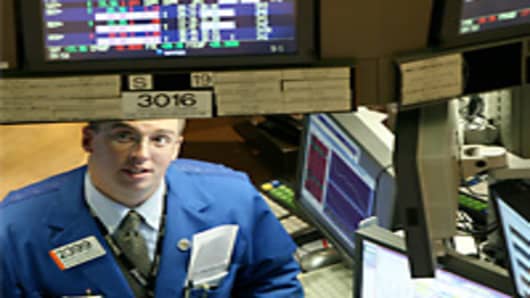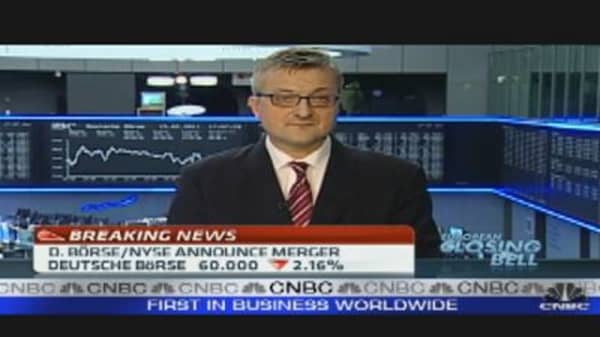There’s an air of paranoia on Wall Street about today’s NYSE deal with the Germans. But history suggests it’s unjustified.
Americans will probably end up running the business. And even maintaining its iconic floor trade in New York, despite dwindling volumes.
You see we’ve been here before. Four years ago, New York brokered a similar deal with another pan-European exchange.
"The NYSE deal with Euronext at the time was sold as a merger of equals," remembers Professor Erik Theissen at Germany’s University of Mannheim. "But it turned out to be a takeover by New York."
Okay, grand trading floors in Amsterdam and Brussels already stood empty in 2007. But the French were adamant they’d keep joint-control with the Americans. They totally failed, says exchange consultant Brian Taylor. "The Euronext trading platform is now hosted near London, I-T development has moved to Northern Ireland and it’s unequivocally headquartered in New York," Taylor says.
Inevitably, the new business unveiled today will also be shaped over time by changing needs.
"Both of them need to reinvigorate their EPS and overcome the politics of loss of market shares," Taylor adds. "The game now is to drive international economies of scale and engineer platforms that have the lowest possible cost to attract the maximum liquidity."
But the US is still the financial capital of the world. Frankfurt is certainly not. Wall Street has the deepest capital markets and employs the brightest brains. It’s logical to conclude the new business will inevitably become more weighted to New York.
After all, it’s already 55 percent-owned by Americans, according to CEO Duncan Niederauer. (Watch video of Niederauer's interview with CNBC above.)
The Derivatives Road Block
European regulators might still block today’s deal. Aside from all the politics of cash trading on national exchanges, it also brings together two of the world’s ‘big three’ derivative exchanges.
Deutsche Boerse part-owns Eurex. And NYSE merged with Euronext in 2007 to get its hands on LIFFE in London. Together, they have a near total monopoly on derivatives in Europe.
"Derivatives are of their very nature a monopolistic-type business," explains Taylor. "It’s not like in the cash market, where Multinational Trading Platforms (MTFs) just spring up after they’ve just got a license, capital and access to a clearing system. No one has been able to successfully break into derivatives trading in Europe."
The first reason is because Eurex and LIFFE can deny new entrants access to their clearing and settlement systems. The second, says Taylor, is because "derivatives are simply not the same as, say, trading Vodafone. VOD is the same product around the world. But exchanges that design derivative contracts can defend those contracts as a form of intellectual property in court, preventing competitors from replicating the trade."
"In fact, incumbents create more and more contracts," says Taylor, "for which there may be a low hit rate. But it means no one can enter their space. It’s a total barrier to entry that locks-out newcomers. Yes, they could create similar contracts but probably would not attract the liquidity, so you’d be risking shareholder funds on products that might not be a success."
Taylor believes that EU regulators will likely block the deal. Or require that one of the major assets in Europe be sold, triggering shareholders on each side to reconsider the deal’s rationale. Others disagree.
"It’s clear that together they will dominate the trade for derivatives," says Theissen at the Centre for Financial Research in Mannheim. "But if you look at the individual products, it’s not so much of a problem. The trading of DAXX Index futures in Frankfurt that is already dominated by Deutsche Boerse’s EUREX, so I’m not sure that you could argue new monopolies are being generated."
That’s the whole point, argues Alasdair Haynes, who as the CEO of Chi-X Europe is already a major competitor in the cash market.
"Deustche Boerse has pursued a vertical model. They clear what they exchange. It’s one of the reasons DB is so profitable. They will have to make concessions on the back end of the business; either sell, shut down or consolidate. But consolidation is a holy grail for clearing and counterparties anyway," Haynes says.
Theissen is more practical. "If the EU makes the deal conditional on, say Euronext selling its back room functions, it would simply clear through Deutsche Boerse’s facilities, making them even more powerful in the market place."




